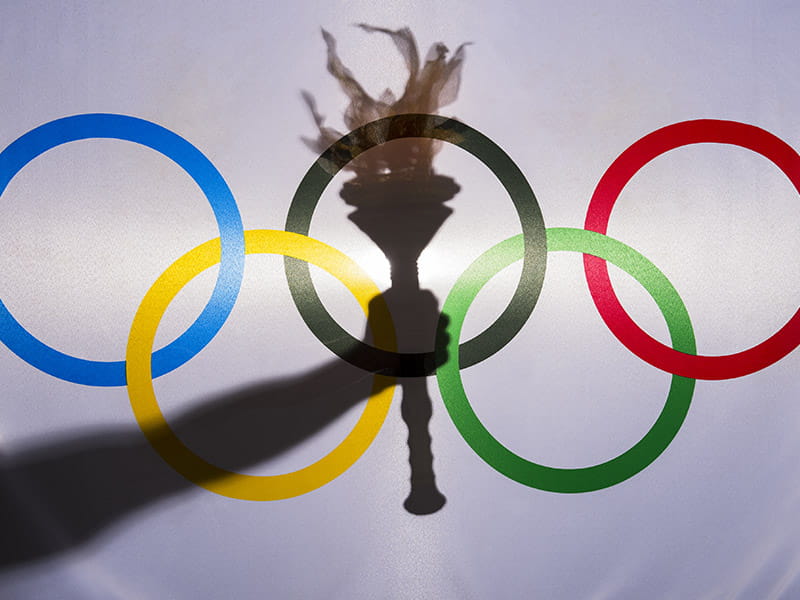The Olympic torch is a symbol, a flame ignited several months before the Summer Olympics, and carried all the way from Greece to the Olympic host city. The torch relay ends with the opening ceremony of the Games, concluding with the lighting of the grand Olympic Flame in the host stadium.
And it all began with the defying of a god. In Greek mythology, Prometheus and Epimetheus were tasked with the creation of man. Prometheus shaped man from the mud, and Athena breathed life into the inanimate figure.
Prometheus loved his creations, and felt sorry for them. Since Epimetheus had already given out all of the wings, fur, claws, and other natural gifts to the animals, leaving humans naked and vulnerable, Prometheus gifted them with fire, and allowed them to stand upright, as the gods did. In fact, he loved man more than he did his fellow Olympians, who had banished his family to the abyss of torment and suffering, Tartarus.
When Zeus eventually took fire away from man, Prometheus stole it back, lighting a torch from the sun and re-gifting mankind with the fire that allowed them to develop their science and culture, both of which are associated with Prometheus.
Zeus was outraged when he discovered this, and punished Prometheus by having him chained to a pillar with unbreakable chains of adamant, and tortured by a monstrous eagle each day. Fortunately, after many years, the great hero, Hercules, killed the eagle, rescuing Prometheus from his torment.
The ancient Greeks, believing that fire was given to mankind by Prometheus, considered it sacred, and used mirrors to focus the sun’s light, igniting fires which burned in perpetuity in front of Greek temples. During the ancient Games, which were held to honor Zeus, more fires were lit at his temple, and that of his divine wife, Hera. Today, the Olympic flame symbolizes the connection between the ancient Olympic games and our contemporary ones.
The first Olympics held under the International Olympics Committee was hosted in 1896, in the Panathenaic stadium in Athens, Greece, bringing together 14 nations and 241 athletes. It didn’t feature the torch yet, however.
That man was Adolf Hitler, who, three years later, would invade Poland, setting off World War II. Surprisingly, the first route the Olympic flame ever took was designed by the Nazis, linking their views of their own Aryan supremacy with ancient Greece and hijacking, in way, the entire event for the purposes of their own propaganda. The runner who brought the flame into the stadium was a blond, white male—a member of the master race, according to the Nazis. The imagery of the flame, the enormous bronze cauldron raised on high, and the ornate pageantry held great appeal to Nazi leadership, and they did their best to use it for their own glory.
The torch was later re-used by the British at the 1948 London Olympics, and the true tradition of the torch, as we know it today—a connection between the ancient and modern games—came into being.
Today, the flame is ignited by concave mirror, far in advance of the games, and travels by runner, by ship, by aircraft, and, sometimes, even by swimmer, making its way to its destination at the Olympic host stadium. One of the most interesting ways the flame has traveled has been by laser, when, in 1976, the flame was translated into a radio signal, relayed through a satellite, and beamed back down to activate a laser, which lit a torch, continuing the run.
The torch, itself, has evolved over the years, the design changing with each game, each time representing a local cultural aspect of the Game’s host nation, or a classical idea. Since 1972, most of the torches have used a liquefied gas fuel such as propylene or butane, which give a bright flame while simultaneously being easily stored and durable. A list of the torch’s designs throughout the years can be found here.
Whatever the design, the symbolism remains the same. Fire is the light in the darkness, a symbol of harmony and goodwill—symbolism which is further enhanced by the fact that the torch run is a relay, with the torch being handed off to hundreds, and sometimes thousands of different people as it makes its way through various countries and cultures, uniting them with a single, flaming thread. Not only does it unite geographically, but temporally as well, with the flame having come forward in time from the ancient Greeks to our modern day, connecting us to our past.
The myth of Prometheus shows us an important aspect of Greek culture—the concept of the hero who possesses the ability to suffer immense challenges. In this case, Prometheus’s choice to defy Zeus by giving fire back to mankind caused him to endure thirty years of daily torture, and he did so with strength and quiet resolve. So, too, does the torch bear this idea with it—the idea of the hero of myth, of the strength and determination that is so celebrated in the Olympic Games, brought into human form through our athlete-heroes who honorably fight for our respective countries. We carry the flame, the beating heart of freedom and passion that all mankind shares, in honor of that indomitable spirit.


